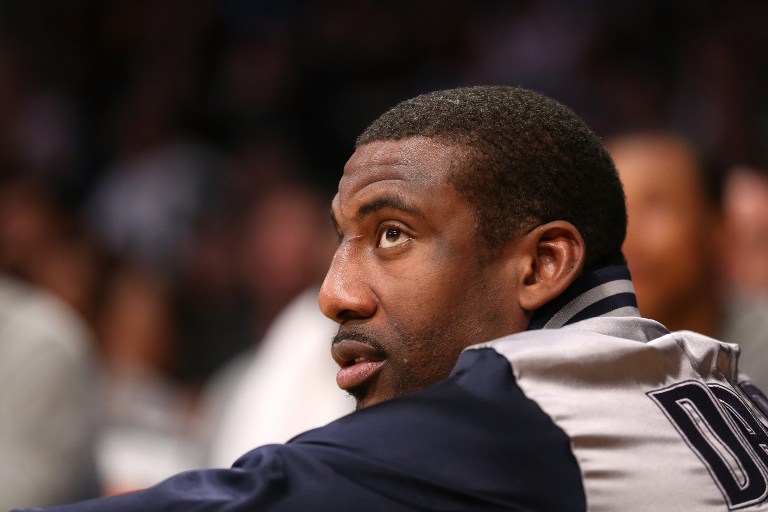
Amare Stoudemire #1 of the Dallas Mavericks looks on during the game with the Los Angeles Lakers at Staples Center on April 12, 2015 in Los Angeles, California. AFP File photo
The big man sat in a chair after practice, ice packs taped to his knees, and spoke about an upcoming basketball season that promises to be far different from the many others he has known.
Amar’e Stoudemire was in Jerusalem, half a world away from the bright lights of New York City, where a Times Square billboard once heralded the former NBA star’s arrival.
He was happy to be here, he stressed, having chosen to play where he feels he has a spiritual connection after a career—and a life—filled with struggle.
“I have no regrets,” the towering 33-year-old American said the day before the first league game of the season with his new team, Hapoel Jerusalem.
Stoudemire, who followed a winding path from poverty to professional basketball fame in the United States, has embarked on a new journey.
After an NBA career that began with great promise was cut short by injuries, Stoudemire has decided to make Jerusalem his home, becoming the most famous name to ever join the Israeli league.
His agent, Happy Walters, said he had at one point converted to Judaism while in New York with an Orthodox rabbi and was seeking Israeli citizenship.
But recently Stoudemire has spoken of himself as a Hebrew Israelite—African-Americans who believe they descended from the ancient tribes of Israel.
He has been a regular visitor to Jerusalem and Israel and a part owner of the team he now plays for, but was to sell his stake when he joined as a player.
He has described his move to Jerusalem as a spiritual one, as well as being about basketball.
“I’m not sure what type of emotions I’m going to feel,” Stoudemire told AFP the day before his first game.
“Playing in front of Jerusalem for the first time is going to be a feeling that I’ve never felt before, I’m sure,” said Stoudemire, whose many tattoos include the Jewish Star of David and another that reads “Black Jesus”.
Long struggles
Stoudemire grew up poor in Florida and has seen his share of tragedy: his father died when he was 12 and his brother was killed in a car accident in 2012. His mother has served prison time.
He didn’t start playing basketball until he was 14 and joined the NBA in 2002 out of high school rather via college—a less common route.
His first professional team was the Phoenix Suns, and he won the NBA’s prestigious rookie of the year award.
He was also named six times to the NBA All-Star game, the annual contest between players selected as the league’s best.
At six feet, 10 inches tall, he had the rare combination of height and athleticism, and footage of him dunking over helpless defenders can be easily found on YouTube.
But injuries—particularly to his knees—blighted his career.
He joined the New York Knicks in 2010, which was seen as the start of a new era for a team with a proud tradition but years of losses.
Despite strong play early in his New York tenure, a new era of championships did not arrive. He was hit by more injuries and parted ways with the Knicks in 2015.
In July, he retired after 14 NBA seasons—and announced he would play in Jerusalem.
Stoudemire told AFP he was proud of his NBA achievements, which allowed him to be “able to establish a lifestyle for my family that they would probably never get a chance (to have) because of the beautiful game of basketball.”
‘Work itself out’
Football is the most popular sport in Israel, but basketball also has a strong following.
Many foreigners have played there, with league rules allowing for a limited number of foreign, non-Jewish players.
Stoudemire’s team plays in an 11,600-seat arena in southern Jerusalem, about a 10-minute drive from the ancient Old City.
His wife and four children have also moved to the city, and he said they were enjoying it.
His new Italian coach, Simone Pianigiani, said he helped the team “with his charisma, with his experience, with his desire.”
On Saturday, at the first league game against Bnei Herzliya, Stoudemire, his hair styled in cornrows, drew a roar from the crowd when introduced at the about three-quarters full arena.
Wearing his familiar black-framed goggles, he started the game and played most of it.
He hustled, at one point darting to save a ball that was going out of bounds and tossing it behind his back to a teammate, leading to a score.
He blocked three shots, the crowd erupting each time.
There was a moment when he was open as he rolled to the basket, and for a second it was possible to imagine him catching a pass and turning for a dunk in a reminder of his YouTube highlights from years past.
But the ball went elsewhere, and Stoudemire finished with only three points, all on free throws.
After the game, which Jerusalem won by 20 points, Stoudemire showed a tinge of frustration, but was happy with winning and spoke positively, saying the team was still figuring out how to play together.
“It’s going to work itself out,” he said.

